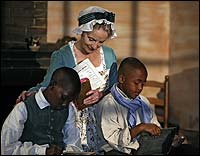The event description says:
Our group of public humanities scholars and practitioners will examine this theme with a care for what it means to leverage recent scholarship, while also doing this work within public history spaces. It considers the social, economic, political, and intellectual worlds of African Americans in their quest to live out the full meaning of freedom.“Public history” was defined as a field in the late 1970s, with the Public Historian journal launched in 1978 and the N.C.P.H. formally founded in 1980. People in the field focus on communicating historical knowledge to the public in an accurate and empowering way. Therefore, I expect this discussion won’t be about the “Conditions of Black Life” in the Revolutionary period per se but about how to interpret, communicate, and discuss those conditions with today’s public.
The program pays attention to nuances and various ways that geography and ecology shaped the idea of black freedom. In so doing, presenters also will foreground the important place that shifting methodologies play in this discussion.
The panelists in this discussion will be:
- Sylvea Hollis, Montgomery College, facilitator
- Yveline Alexis, Oberlin College
- Ista Clarke, Charleston County Parks Department
- Maya Davis, Riversdale House Museum
- Marcus Nevius, University of Missouri
There are further conversations in this series scheduled, but it looks like they’ll be part of conferences and not livestreamed for the public.

No comments:
Post a Comment